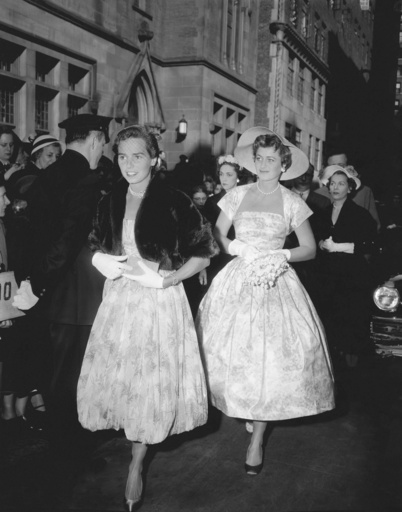BOSTON — Ethel Kennedy, widow of Senator Robert F. Kennedy, passed away on Thursday at the age of 96, according to her family. After her husband’s assassination, she dedicated herself to raising their eleven children while remaining committed to various social causes and the family’s legacy over the years.
Joe Kennedy III shared the news on X, stating, “It is with our hearts full of love that we announce the passing of our amazing grandmother. She died this morning from complications related to a stroke suffered last week.” Family members expressed their sorrow, highlighting her lifelong dedication to social justice, leaving behind nine children, 34 grandchildren, and 24 great-grandchildren, all of whom loved her dearly.
President Joe Biden referred to her as “an American icon— a matriarch of optimism and moral courage, an emblem of resilience and service.” He praised her tireless work over five decades for human rights on a global scale, noting her impactful presence filled with determination and grace.
Ethel, mother to Kathleen, Joseph II, Robert Jr., David, Courtney, Michael, Kerry, Christopher, Max, Douglas, and Rory, was one of the last remaining members of a generation of the Kennedy family, which also included President John F. Kennedy. Notably, she had just enjoyed a visit with many relatives before her health declined.
Born into a wealthy family, Ethel married Robert Kennedy in 1950. By the time she reached 40, she had confronted more loss than most people experience in a lifetime. She was present when Robert was assassinated in 1968, just after he had won California’s Democratic presidential primary, and had previously suffered the loss of her brother-in-law in a similar tragic event less than five years earlier.
Her own parents died in a plane crash in 1955, and she faced the loss of her brother in another crash in 1966. Over the years, she mourned the deaths of her son David, who died of an overdose, son Michael, who perished in a skiing accident, and nephew John F. Kennedy Jr., who was also lost in a plane crash. Family friend Philip Johnson noted the unusual burden this family had endured over the years.
Ethel’s strength was rooted in her faith and devotion to her family. “She was a devout Catholic and a daily communicant,” the family shared, adding that they found comfort in knowing she is reunited with her loved ones who had passed.
Rose Fitzgerald Kennedy, Ethel’s mother-in-law, once expressed concern for Ethel navigating such tragedy. In her memoirs, she reflected on Ethel’s struggle to raise her large family without Robert’s influence, yet noted her strength to carry on despite the overwhelming challenges.
Following Robert’s assassination, Ethel established the Robert F. Kennedy Center for Justice and Human Rights. Throughout the years, she advocated for various causes, such as gun control and human rights. Though she rarely discussed her grief regarding her husband’s murder, during a documentary made by her daughter, she struggled to reflect on the loss.
Several of Ethel’s children gained prominence in their respective fields. Kathleen became lieutenant governor of Maryland, Joseph served in Congress, and Kerry became a human rights activist, among others. Robert F. Kennedy Jr. rose to national fame initially as an environmental advocate but later became a polarizing figure in the political landscape.
Her family often witnessed tensions arising from her son’s controversial statements, but Ethel chose to remain silent on his public actions. In contrast, she had once exuded excitement and pride during the Kennedys’ rise to political power, supporting her husband’s campaigns and hosting notable social gatherings.
After Robert’s death, Ethel divided her time between homes in Hyannis Port, Massachusetts, and Palm Beach, Florida. Ethel was born on April 11, 1928, and grew up surrounded by affluence as part of a large family in Connecticut. She met Robert through her college roommate, and their life together was marked by a blend of privilege and commitment to public service.
Following the assassination that forever changed her family, Ethel continued to navigate life with resilience. Recognizing the importance of justice, she expressed her views on the potential release of her husband’s assassin, indicating sensitivity to her family’s myriad losses while standing firm in her beliefs.
Ethel Kennedy remained unmarried after her husband’s death, though she was romantically linked to various individuals over the years. Commemorating her late husband’s legacy, she often reflected on his profound impact—revisiting the speech he gave on the night Martin Luther King Jr. was assassinated, which helped quell potential riots.
In a reflection on Ethel’s life, it was noted that she emerged as someone deserving of admiration not just for her perseverance but for her active support of civil rights and humanitarian causes. Her legacy lived on in her work and through the RFK Center, where her commitment to social justice continues.
Ethel remained engaged in various organizations and was present during public demonstrations, consistently supporting the fight for dignity and equality. Highlights of her life included receiving the Presidential Medal of Freedom and participating in significant remembrance events, where former presidents recognized her contributions to society.
As tributes poured in following her passing, notable figures echoed sentiments about her unyielding spirit and the profound impact she had on countless lives, affirming that her commitment to justice and human rights will endure through the initiatives she championed and the legacy she leaves behind.


